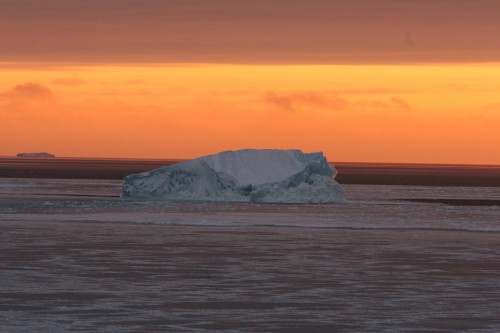
Putin’s Agenda: The Arctic Revival
Publication: Eurasia Daily Monitor Volume: 8 Issue: 230
By:

Russian foreign policy under Vladimir Putin is increasingly resorting to gunboat diplomacy (see EDM, December 12). However, another key element in Putin’s agenda has been his aggressive campaign to assert Russian interests in the Arctic. The aggressiveness has been manifested in earlier rhetorical exchanges and the resumption of Russian military flights over and from the Arctic, as well as pronounced efforts to rebuild Russia’s military in addition to its economic presence there. The purpose, along with the ongoing Russian scientific expeditions in the Arctic is to gather the materials needed to substantiate Moscow’s claims to major portions of the disputed Arctic territory when it presents its case to the UN Commission on the Limits of the Continental Shelf in 2012 (Interfax-AVN, November 25).
The borders of the Continental Shelf are disputed by many powers, and it is hardly certain that Russia will make good on its claim. But that has not deterred Moscow from attempting to secure its claims and to build up its energy and defense infrastructure in the Arctic. In 2010, it signed a major accord with Norway that signified the East-West rapprochement of 2009-11 and eased tensions by delimiting their respective Arctic boundaries. More recently, it was announced that Russia and Iceland plan to sign an Arctic cooperation declaration. This declaration will promote their political dialogue, improve the bilateral legal and contractual framework, enhance trade and economic relations, and lay the foundation for other, more innovative energy projects (Interfax, November 29).
At the same time, Moscow has launched an Arctic ecological program to clean up the heavily polluted area and monitor the Arctic climate. Overall, Russia will spend 21 billion rubles ($674.83 million) through 2014 to build and upgrade the Arctic’s marine infrastructure, broaden its transport infrastructure, and revive Russia’s icebreaker fleet (Interfax, November 22). But beyond this Russia intends to make the Arctic the future centerpiece of its next generation energy policies, believing that it is literally a treasure house of raw materials that will become increasingly available for exploitation and development, as well as intercontinental trade as climate change continues. Thus, Putin has also now signed off on an Arctic oil pipeline worth $3.6 billion to new Arctic oil fields. The Zapolarnye-Purpe link will be completed by 2017, and will be used by TNK-BP, Lukoil and GazpromNeft to transport up to 45 million tons of oil annually form fields in the Yamal Peninsula that they expect to develop (The Moscow Times, November 25). Officials estimate that these fields could produce up to 74 million tons per year by 2020 amounting to 15 percent of Russia’s current output of 500 million tons of oil. The 500 kilometer pipeline would then connect to Russia’s pipeline system, facilitating exports to Europe and Asia. Currently, that probably means it is more likely to go to Asia, where it could command a better price (The Moscow Times, November 25).
Moscow now suspects that foreign military threats might be growing in the Arctic, which is strategically vital to Russia for reasons beyond energy. The Arctic and the base at Severodvinsk is the home of Moscow’s nuclear Northern Fleet that houses its primary naval nuclear arsenal. Rumors of NATO’s interest in resolving Arctic territorial disputes, or worse from Moscow’s viewpoint, deployment of elements of the US/NATO missile defense systems, threaten not only Moscow’s efforts to monopolize as much of the Arctic as it covets, but also and possibly more importantly, its vital second-strike nuclear deterrent located there (Interfax-AVN, November 29). As the editor of The National Defense Magazine, Igor Korotchenko observed, “This is a real threat given the fact that the Aegis-equipped vessels are identical to the systems that will form the Euro ABM. Such anti-ballistic missile complexes near Russian borders directly threaten its strategic nuclear forces. Ship-based missiles may intercept Russian intercontinental ballistic missiles and Americans are constantly upgrading the Aegis. It is unacceptable for Russia to have permanently deployed ABM naval systems close to its coastline” (The Voice of Russia, November 14).
Indeed, Moscow has warned since at least 2010, if not earlier, against NATO stationing any missile interceptors in the Barents Sea (www.barentsobserver.com, December 3). Accordingly, Russian officials have now gone on the offensive. Foreign Minister Sergei Lavrov has warned again that there are no reasons for NATO’s “interference” in Arctic affairs (Interfax, November 29). Lavrov has also repeatedly demanded binding legal guarantees that this missile defense system cannot be used against Russia or its nuclear weapons (The Voice of Russia, November 14). Following President Medvedev’s speech on November 23, outlining Russia’s defensive moves against the missile defense network (www.kremlin.ru, November 23), Lavrov and his Deputy – Dmitry Rogozin, the Ambassador to NATO – have singled out the possibility of NATO naval deployments in and around the Black, Baltic and Barents Seas as being particularly objectionable (The Voice of Russia, November 14; rosbuisnessconsulting.com, November 28).
Rogozin also warned that such deployment constitutes a violation of the Paris Treaty of 1997, barring “substantial combat forces” from being deployed in those waters, and could lead Russia to break off its cooperation with NATO (The Voice of Russia, November 14; rosbuisnesconsulting.com, November 29).
Time will tell to what extent such threats are serious. But they clearly underscore the vital importance of the Arctic to Russia, from both the economic and defense perspectives. Indeed, these two perspectives are linked, since both the Army and Navy are tasked with defending energy installations. Undoubtedly, Russia will also have to navigate in both senses of the word around the contending border, energy and security claims with Western powers. But it will also have to deal with a whole series of different challenges to its Arctic ambitions, not from NATO, but from China. And that problem opens up a whole series of other unpleasant issues for Moscow.




